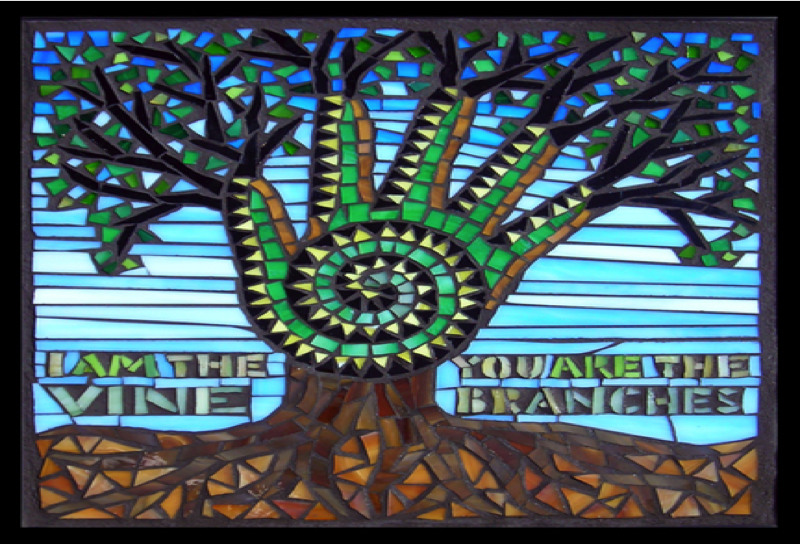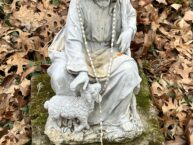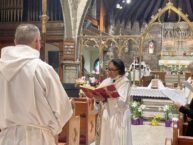 May 3, 2015: May God’s words alone be spoken, may God’s words alone be heard. Amen.
May 3, 2015: May God’s words alone be spoken, may God’s words alone be heard. Amen.
In the Guinness Book of World Records there is listed the shortest sermon ever preached. It was given by John Albrecht, an Episcopal priest in Michigan (not a surprise it was an Episcopal priest – Baptist – Never!). Anyway, he stood in his pulpit to preach, paused, and said “Love!” He then sat down. Some of Albrecht’s members said it was the best sermon he ever preached.
Just so you know…This is not that sermon.
But it could be.
Now there is a danger, they say in seminary, of ever trying to use more than one of the scriptures in a sermon on a given Sunday, but what the heck – life is short…and these were just too related to one another to pass up. So…fasten your seat belts, you may be in for a bumpy ride.
In the gospel passage from John today, it said that Jesus spoke these words: “Abide in me as I abide in you. Just as the branch cannot bear fruit by itself unless it abides in the vine, neither can you unless you abide in me. I am the vine, you are the branches. Those who abide in me and I in them bear much fruit, because apart from me you can do nothing.”
This is a familiar and powerful metaphor for who we are as followers of Jesus. Listen to those words: “…Abide in me as I abide in you… I am the vine, you are the branches.” It’s a statement of mutuality, of relationship, of connectedness. It is a statement of who we are as children of God.
I remember a story about a member of a certain church, who previously had been attending services regularly, but had stopped going. After a few weeks, the pastor decided to visit him. It was a chilly evening. The pastor found the man at home alone, sitting before a blazing fire.
Guessing the reason for his pastors visit, the man welcomed him, led him to a comfortable chair near the fireplace and waited. The pastor made himself at home but said nothing. In the grave silence, he contemplated the dance of the flames around the burning logs.
After some minutes had gone by, the pastor took the fire tongs, carefully picked up a brightly burning ember and placed it to one side of the hearth – all alone – then he sat back in his chair, still silent. As the one lone ember’s flame flickered and diminished, there was a momentary glow – and then – its fire was no more. Soon it was cold and dead. And still not a word had been spoken since the initial greeting.
The pastor glanced at his watch and realized it was time to leave. He slowly stood up, picked up the cold, dead ember and placed it back in the middle of the fire. Immediately it began to glow, with the light and warmth of the burning coals around it.
As the pastor reached the door to leave, his host said with a tear running down his cheek, ‘Thank you so much for your visit and especially for the fiery sermon. I shall be back in church next Sunday.’
So often, I hear folks say, “I’m spiritual, but not religious,” I am saddened – for them, and for the church – or for whatever religious group association may have been theirs – church, mosque, synagogue, temple. I am not saying that God does not have the power to engage in relationship with someone outside of the church – anything is possible with God – and that does happen. But, human beings are generally creatures of community, albeit on very different Meyers-Briggs scales of introversion and extroversion (just take a look at the way folks react to The Peace). It is this need for community, and what creates community, that our scriptures today are telling us.
Now, I never thought I would utter these next two words in a sermon, and would have asked someone to shoot me if I did (for the congregation’s sake), but here goes… Karl Barth. Karl Barth is a brilliant, if not dense and dry, theologian that seminarians labor to understand and threaten never to read anything on the scale of his seminal work “Church Dogmatics” ever again (if you ever suffer from insomnia – Karl Barth is the cure). But, he did write about humanity and our relationship with God and each other in a most profound way when he said, “I am as I am in a relation.”[1] The “I” for Barth is not an isolated thing, but something that exists alongside of a “Thou” (or for the Rite II folks…“You”). For Barth, we exist only as we are in relationship with the other. Our humanity depends on it. Like the ember that died when the pastor pulled it out of the fire, we die when we disconnect ourselves from God, and from each other.
Look at the contrasting images of Nepal, and of Baltimore. Baltimore – a city I lived in before I moved to New Jersey – a city under siege from the anger that is born of injustice. And in Nepal, a country under siege from a devastating earthquake with thousands dead, homes destroyed. In both places, there is a need for one thing – love. Love that is born of relationship with the other.
People rushing in to help others – strangers – all over Nepal. And people standing up calling for peace, peace with justice, in the streets of Baltimore. That is love in action. That is relationship defined. And the church, the body of Christ in the world today, needs to always be a part of that reconciling love, part of that healing response to the hurt of the world.
See, I think where the church has often gone wrong, and why some feel that they need to be “spiritual, but not religious,” is that we have lost our way as a living body of Christ. We have fallen out of relationship and begun to dry up and die. You see, we are organic beings. We grow and change. But, the church can often seem to be as fleet and flexible as the Titanic… and we all know what happens to a ship that refuses to see the iceburg until it is too late.
Jesus is telling us that we are not stones, but part of a living plant – with him as the core root. A vine is not a static thing – if it were, it would be dead. The body of Christ, fed with the love of God, is also not to remain fixed, stagnant, and lifeless. We are to grow, connected to the vine of Christ, a vine rooted in God’s love, and fed with the water of baptism. For us to grow, we need to prune ourselves of the fears that bind us to what we thought we knew, and step boldly forward in love – reaching outward to our brothers and sisters. This is a communal thing, not something done in isolation. A vine cut off from its roots will wither and die, but as long as we remain rooted in the love of God, we will thrive and grow in the love of Christ.
Look at the story of Philip and the Ethiopian Eunuch (you knew I’d get that Eunuch in there somewhere, didn’t you). It’s a fabulous story…the Ethiopian is reading scripture – a passage from Isaiah, and along comes Philip – sent by the Holy Spirit. The Ethiopian doesn’t proceed to tell Philip what he is reading, but implores him to engage with him about the scripture’s meaning. They begin a dialog of faith. If only people came to scripture today with that level of openness to interpretation. Well, truthfully, if only we came to any subject really with that same willingness to listen more than we talk, the world would be a better place to be sure.
As I said last week, the bible is the most purchased book…and the least read. Today many want to tell people what the bible says, rather than enter a mutual dialog of faith. Today, there are many who use snippets of scripture out of historical context to marginalize, oppress and abuse, making the church about the walls that keep people out, rather than the life giving body of Christ that welcomes all. No wonder some reject religion in hopes of a separate relationship with God – a relationship outside the walls of perceived intolerance. As someone once said, “God wants spiritual fruit, not religious nuts.” It would seem that those who seek God outside the church do too.
See, the thing is – Jesus doesn’t say… I am the vine, and you are the branches – go grow: but only in this way, or that way. That’s the thing about a grape vine – it is messy, it is entangled, it is unpredictable. Too often through the centuries, our churches have wanted things to be orderly, predictable and perfect – like we always have done it. And those who don’t fit the mold, are made to feel unwelcome in subtle, or not so subtle, ways.
I suspect that if pruning of the grape vine were being done by God today, the dead branches to be cut away would likely be those of churches that do not welcome the stranger, feed the hungry, clothe the naked, and shelter the homeless – because their heart has grown cold. I believe that the pruning would also cut away the branches that have lost a connection with the life giving sacraments of baptism and the Eucharist, and a worship experience filled with life – because they are no longer giving nourishment. And, I believe that the pruning would leave cut on the ground those branches that value order over justice, dogma over deliverance, cleanliness over charity.
So how do we keep ourselves nourished, growing, and connected? How do we be the living branches of the vine of Christ? The answer lies in the passage from1 John read today: “God is love, and those who abide in love abide in God, and God abides in them…There is no fear in love, but perfect love casts out fear; for fear has to do with punishment, and whoever fears has not reached perfection in love. Those who say, “I love God,” and hate their brothers or sisters, are liars; for those who do not love a brother or sister whom they have seen, cannot love God whom they have not seen.”
Many claim to love God in the shadow of hate and fear of their brothers and sisters – but that is not possible. For as we are in relationship with our brothers and sisters, we are in relationship with God. They claim to love God, but fear any experience or person that is unfamiliar or new. They have forgotten who they are as children of the living God, because we cannot claim to love God, and hate our neighbor or treat our neighbor who looks, thinks, acts, or loves differently with disrespect. We cannot love God and turn our backs on the stranger – the immigrant on our shores, and the homeless in our streets. We cannot love God and abuse God’s creation – the animals, the earth, ourselves, or our brothers and sisters on this world.
There is a poem titled baptism that I would like to share with you all:
“In every life, there is a moment when we move forward… fully embraced, like water that drenches our souls. We are alive again, renewed and connected to the vibrations of life, the music of humanity. And in that moment, we realize that who we are is ever connected to who our neighbor is. We splash in the beauty and joy of the water, but that comes at a cost – because we know, even in our wet underbellies, in our deepest and innermost places, that we are here, not for ourselves alone, but for all who cannot, for the desert in their lives, feel the water of life. We are here for them, and they for us.”[2]
Relationship rooted in love – that is what it is all about. That is what this faith of ours is all about. And it is in baptism that this life on the vine begins for us.
I am, as I am in relationship with others, and with God.
We are brought into community – the body of Christ, the living vine, in the waters of baptism. We are nourished with the body and blood of Christ, renewed to continue to grow, to continue to reach out and spread God’s love to all of creation. We need each other, and we need “the other,” if we are to be a thriving branch of the vine of Christ. It is our love of our brothers and sisters and all of creation in a messy, wild and free interwoven vine of relationship that is the body of Christ alive in the world today. And the world needs the nourishment of this vine now, more than ever.
It isn’t complicated.
It isn’t dogmatic.
It isn’t out of reach.
It is simple, personal, and close.
It is as simple as the shortest sermon ever preached.
It is “love.”
Amen.
[1] Church Dogmatics, p. 246. It is worth noting that Barth here is likely drawing on the work of Martin Buber’s iconic work “I and Thou.”
[2]“Baptism,” D. Wilcox, 2009.
[Sermons as written may not be as delivered on any given Sunday]Rev. Diana L. Wilcox
Christ Church in Bloomfield & Glen Ridge
May 3, 2015
The Fifth Sunday After Easter
1st Reading – Acts 8:26-40
Psalm – Psalm 22:24-30
2nd Reading – 1 John 4:7-21
Gospel – John 15:1-8






